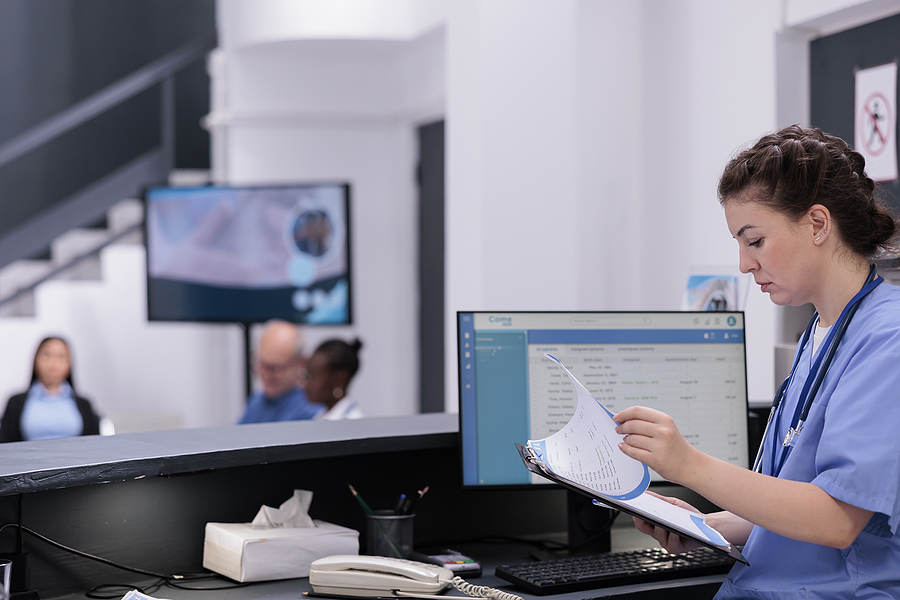Mastering Medical Office Procedures: Essential Skills for Medical Assistants
Posted On August 29,2023
If working toward a thriving and accomplished career as a medical assistant is your aspiration, it’s important to recognize the comprehensive spectrum of medical office procedures that fall within the responsibilities of this pivotal role. While the path to becoming a medical assistant inherently encompasses the essential training required for working in this field, the true hallmark of success lies in your dedication to achieving mastery across a wide array of tasks. These encompass not only the clinical and administrative dimensions but also the cultivation of a diverse group of soft skills that are indispensably crucial for seamlessly navigating the multifaceted responsibilities as a medical assistant.

Delving into a career as a medical assistant demands more than a cursory understanding of clinical tasks or administrative obligations. It necessitates an unwavering commitment to honing the skills needed to proficiently execute the clinical procedures that outline patient care and facilitate treatments.
Simultaneously, your prowess in administrative duties will play a pivotal role in ensuring the operational efficacy of medical facilities, encompassing tasks such as appointment scheduling, medical billing, and maintaining meticulous electronic health records.
Yet, beyond the technical proficiencies there is an interpersonal finesse that elevates a good medical assistant to an exceptional one. The intricate web of soft skills—comprising effective communication, empathetic patient interaction, teamwork, and adaptability—forms the backbone of your capacity to forge meaningful connections with patients, collaborate seamlessly with colleagues, and respond adeptly to the dynamic nature of a busy healthcare environment.
What Does a Medical Assistant Do?
Medical assistants are healthcare workers who are there to support the rest of the healthcare team, either in a clinical or administrative role. Clinical medical assistants are usually directly involved with patient care. This can include greeting patients, taking their vital signs, medical history, and important information related to their visit, and preparing them for the doctor or nurse to assess and treat them.
Administrative medical assistants have less clinical patient interaction, and will handle a wide variety of administrative needs in the medical office. This includes working with insurance companies and billing, scheduling appointments, speaking with patients on the phone, and keeping medical records organized, allowing the office to run smoothly.
Becoming a Medical Assistant Means Mastering the Hard Skills
Hard doesn’t mean difficult when you’re a medical assistant. These skills are usually called clinical skills and are the more technical and specialized skills you’ll need to master when becoming a medical assistant. Whether you are working in a clinical or in an administrative role as a medical assistant, you will need to master certain skills needed to perform your job well. When becoming a medical assistant, these skills will be part of your training program and externship, but there is always more to learn. As a medical assistant, you will develop clinical skills such as measuring vital signs (pulse, blood pressure, temperature, oxygen levels), how to take a patient’s medical history, how to give injections, and how to perform life saving skills like CPR. Medical assistants will often learn additional skills depending on their role, such as phlebotomy skills. Since many medical assistants also have an administrative role, you will need to master those skills as well, which can include learning the software for the scheduling, billing, and charting systems. Medical assistants are often responsible for updating medical records, and you will need a strong understanding of the software programs.
Developing Soft Skills as a Medical Assistant
As a medical assistant, soft skills can be just as important as clinical skills. Soft skills refer to the skills you will use when you interact with patients, other medical professionals, insurance companies, or family members. When becoming a medical assistant, you will spend some time honing your soft skills alongside your clinical work. Some of these skills include:
- Communication Skills: Good communication skills include both active listening as well as effectively speaking with both patients and medical professionals. As a medical assistant, you will help your patients feel comfortable, get their medical history, and then convey that to the medical team. Often, you will then take information from the medical team and convey it back to the patients to ensure they understand. Communication skills are vital as a medical assistant.
- Organizational Skills: Medical assistants need to juggle multiple tasks throughout their days. Knowing how to prioritize each task and stay organized is important. When a medical office is disorganized, patient care suffers. Everyone needs to take responsibility for an organized office.
- Attention to Detail: Little things matter in the healthcare field. A medical assistant needs to have excellent attention to detail.
- Interpersonal Skills: As a medical assistant, you will work with many different members of the medical team. You need to have strong teamwork skills to keep the office running smoothly.

A career in the medical field has many benefits including opportunities for advancement, competitive wages, and job stability. To be a successful medical assistant with the right skills, you need to find an accredited training program. Becoming a medical assistant can be done in as little as a few months. When you go through the training, you will develop the right skills and learn how to be a successful medical assistant. If you’re interested in learning more about how to become a medical assistant, or get information about how to enroll in our comprehensive medical assistant training program, contact Athena Career Academy today!